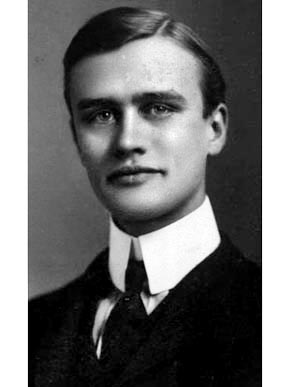

in the early 1900's
T. S. Stribling (1881-1965)
Thomas Sigismund Stribling was an American writer and attorney who published under the name, T. S. Stribling. T. S. Stribling was the author of 16 novels and was notable for his trilogy about the Old South, beginning with The Forge, published in 1931. His second book in the series, The Store, won the Pulitzer Prize for Fiction in 1933.
Stribling was born on March 4, 1881, in the small town of Clifton, Tennessee, to Christopher Columbus Stribling and Amelia Waits Stribling. He spent many of his boyhood summers in Gravelly Springs, the Lauderdale County farm home of his maternal grandparents. Lauderdale County became the setting for several of his novels. Stribling's father was a Union soldier captured during the Battle of Shiloh. Later, his father was a postmaster and general store operator in Clifton.
Thomas Stribling began writing at an early age, believing he had a calling to be a writer. He sold his first story for $5 at the age of 12. However, his father disapproved and refused to pay for his son's education unless Thomas entered one of the professions.
In the fall of 1902, Stribling graduated from the Florence Normal School (now the University of North Alabama), earning his teaching certification there in just one year. After teaching mathematics and physical education in Alabama for one year, he returned to school at the University of Alabama School of Law, where he graduated in 1905. Stribling practiced law in Florence for soon-to-be-governor Emmet O'Neal and later for another attorney, John Ashcraft.
Writing remained his true calling, and Stribling left the practice of law, moving back to Tennesee in 1907. He wrote magazine articles and reported for the Chattanooga News. In 1917, his first novel, The Cruise of the Dry Dock, was published. Stribling's second novel, published in 1922, Birthright, was about a Harvard educated mixed-race man, Peter Siner, living in a small Southern town rife with racial prejudice. In 1924, the book was adapted for the screen by African American director Oscar Micheaux and featured an all-black cast. Micheaux remade the film with sound in 1939.
Teeftallow (1926), Stribling's first bestseller, and Brightmetal (1928) were both set in middle Tennessee and through satire examined social problems of the south. Teeftallow became Stribling's first bestseller and was adapted to Broadway under the title, Rope.
In 1930, Stribling married Louella Kloss (1899-1993), a music teacher. The couple had no children. Stribling continued to write about the social issues in the South, gaining critical praise. In 1930, he finished The Forge, the first of his trilogy following the fictional Vaiden family. James Martine wrote, "Through not great literary art, Stribling’s trilogy is, nevertheless, historically significant; for in The Forge, The Store, and Unfinished Cathedral, Stribling introduced a subject matter, themes, plot elements, and character types which parallel and at the same time anticipate those that William Faulkner, who owned copies of this trilogy, would treat in Absalom, Absalom! and in the Snopes trilogy." The trilogy traces the lives of the Vaiden family of the Florence and Lauderdale County area, addressing many topics considered taboo in the South.
When the second book of the trilogy, The Store, won the Pulitzer in 1933, Stribling was reportedly unimpressed with the award. He showed it to his wife once, then stored it in the attic.
The final book in the trilogy, The Unfinished Cathedral, was published in 1934.
Although it received worldwide praise, The Store was not welcomed so warmly by residents of Florence, as the novel highlighted political and social injustices in the town, and presented realistic portrayals of racial relations. The public libraries would not allow the novel in their collection. Some residents considered suing Stribling for libel. When Stribling learned to the possible suit, he contributed $100 to the libel fund against him. He never denied that he had used Florence citizens as models for his characters. In 1934, he even penned an apology to the city of Florence in the local newspaper. Nevertheless, Stribling did not return to Florence for the next 30 years.
In the 1960s, Stribling was invited to speak at Florence State College, now the University of North Alabama. Thereafter, he spoke frequently throughout the area. Ironically, The Store became required reading for all of Florence State's freshman English classes. As the University of North Alabama, the school maintains a special collection of Stribling's work.
During the 1920s and 1930s, Stribling's novels sold more than any author (including Faulkner and Hemingway) at that time. He was Doubleday Publishing's best selling author, with his trilogy selling more than 240,000 copies.
Stribling and his wife moved back to their hometown of Clifton in 1959. During his final months, the couple stayed in Florence, where Stribling died on July 8, 1965.
T. S. Stribling is buried in Clifton, Tennessee. The Stribling home is now a public library and museum located at 300 East Water Streen, Clifton, TN 38425.
 |
 |
| T. S. Stribling, as a young man in the early 1900's |
The Store |
Novels